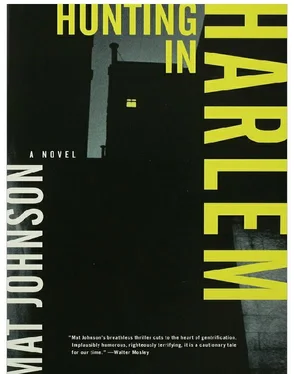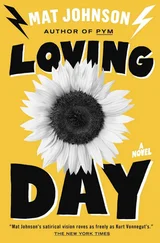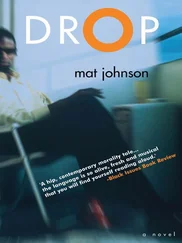"Forgive me, sir, but how can there be so many? This won't be a permanent situation for them, right?" In response to the question, Cyrus Marks pulled on his shiny lapels, smirked amused disappointment.
"Mr. Snowden, Mr. Cedric Snowden of 124 Winona Street #2, Philadelphia 19144. I'm surprised, really. I've read your file. You've experienced the alternative: multiple foster families, chaos. Do you think these children have ever had more stability than they do with us?"
The entire journey seemed impossibly long, and yet somehow, when Snowden returned, Bobby was still talking.
" — so while the popular theory among New Yorkers may be that the cause of the high price of apartment rentals is due to property owner greed. . " Bobby squinting. Bobby tilting his head to the right and lifting his hand for emphasis. Snowden saw him doing the same thing the night before when they were drunk and aping the president on television. Bobby Finley looked more sincere doing the move than the man he stole it from. Practice is cheating. "The true reason is that owners are forced to compensate for income lost due to unrealistic price fixing."
"We charge as much as we do." Like a Jamaican DJ, M. R. Linden liked to start it up only to stop and bring it back again, beginning anew once he was sure he had complete attention. "We charge as much as we do because we can. For every fifty people who won't pay twenty-four hundred for a four hundred-square-foot one-bedroom four-story walk up with no windows, there's some asshole with good credit who will, who'll smile when you drop the keys in his hand because 'it's only five blocks to the express subway.'" The last bit M. R. Linden offered in his own interpretation of a New York homosexual. Snowden's body tightened in response to the entire presentation. Horus began applauding. Bobby took notes. His handwriting was so small it was like he was hiding something even from himself.
"M. R. Linden is a troglodyte," Lester said after the first lecturer had departed. "But he is very talented at what he does. Listen to what he says. Take his skills and apply them to your own agenda." Bobby wrote that down as well, Snowden watched him.
It was always like this. Linden would lecture and then, ten minutes after disappearing into the Town Car waiting outside for him, Lester would take his place and spend the first minutes of his teaching time discrediting the other's opinions. The first day it was: "That is the difference, that is what Horizon is about and that's why you're here. Horizon is not about building profits, it's about building a community." It was the kind of thing that every company said, a hint of social agenda worn like perfume to make the business that much more enticing. Even McDonald's bragged about paper wrappers. Snowden found it disorienting to actually believe Lester meant it.
Lester went with it, this theme he was pushing. The second segment of the day Lester called "context." Specifically, how power brokers like Alain Locke created the Harlem Renaissance out of almost nothing, contacting artists and intellectuals nationally and telling them to come here because there was a vibrant community. And because they came, there was.
Lester in lime. Lester in a glowing lime suit, matching shoes and tie, socks and shirt in lemon. This was where he looked most comfortable, a book and lectern in front of him, a blackboard behind. Wendell entered the room and sat in the corner staring at him, panting to the rhythm, tongue hanging to the side in awe.
To wrap up the first day of school, Lester pulled out an old record player on a wheeled cart in the corner. The voice within the scratches was that of Alain Locke himself, talking about the influence that period of old Harlem had on black America. An hour on, while the three waited for their pizza at Slice of Harlem, Bobby did an almost dead-on impersonation of Locke by sticking two fingers up his nose and humming the words out the top of his palate. His slices of sausage and mushroom gone before the others had managed three bites, Horus used the silence created by full mouths to share his sole commentary about the day's proceedings. "That Locke dude, the one he was playing? I bet you could tie both my wrists behind my back, and make a rule that there was no kicking, and I could whup his ass real good. Just with my head, no hands."
What was stunning about this remark was not just that this was the one and only thing Horus would say about the six hours of intensive study, but that he would offer nearly the same solitary observation in the weeks that followed. From Lester's lecture on W E. B. Du Bois's identification of the educated middle class as the Talented Tenth and how their post-civil rights flight to the newly integrated suburbs sent Harlem into its ghetto tailspin: "Definitely. That Doobie brother. You could tie, like, my left hand to my right foot, and give the dude a large, wooden club, and I could whip his ass. Probably in less than a minute, if he got close enough."
Even when Lester delivered his surprisingly moving sermon about Horus's own former stomping ground, the Cabrini Green projects, where the city gave half the apartments to working families as condos to break the culture of poverty, create an environment where people worked, invested in their homes. By the time Lester got to the end of it he was sweating so hard beneath his shirt that even his tie was soaked to his chest. He said, "Imagine what we could do for Harlem following that model," but his voice was hoarse, wasted. After putting the needle down on a old record of Langston Hughes reciting "Low to High," "High to Low," Lester collapsed on the pulpit, exhausted by his performance. Snowden could smell him from his seat, the scent stronger as the service went on, but he didn't care. Snowden was too moved to be bothered, too jealous of the passion. Even for a cynic, it was easy to get drunk on the dream of Horizon, to imagine one's life no longer without reason.
Despite his earlier emotion, when the lesson was over and the three were waiting for their lunch to heat up in the ovens at Slice of Harlem, Snowden found himself playing the rational counter to Bobby's evangelism.
Snowden: "I'm just saying, wait, see. It's always about money. If this ain't, that's great, but it's always about money."
Bobby: "That's your problem. You don't know what to believe and when to do it. You've got to have fire."
Snowden: "Even if Lester's for real, the way he talks about a new community in Harlem, what's going to happen to the people here who don't fit into that? We just going to kick them out on somebody else's streets every time we get a chance?"
Bobby: "That's a shame for them but it's not about what's best for some individuals, it's about what's best for everybody. Malcolm X said, 'By any means necessary.' People like that drug dealer Parson Boone, you don't worry what happens to them. Morally, the purity of the goal is all that matters."
Horus: "That Hughes dude, that's not even a challenge. It'd be like, two hands handcuffed behind my back, one set of cuffs linked through to my right ankle, and still, I whup him, no problem. On one leg. My left one. I still whup his ass in a minute twenty."
It wasn't that Horus was dumb, nor was it that he hadn't been listening. It was that he simply had no questions. Aside from, "When we going to eat?" and "When we getting paid?" Horus never had questions. You just told him something and he moved forward with it in mind. It was a wonder no army besides the Black Stone Rangers had ever recruited him.
After lunch, Snowden returned from work to find his door vibrating with the sound of the television on the other side. He got depressed. Jifar hadn't been over in days and he'd begun hoping his secret dream had come true, that God had taken the time to reach down and smite the boy's father.
Читать дальше












